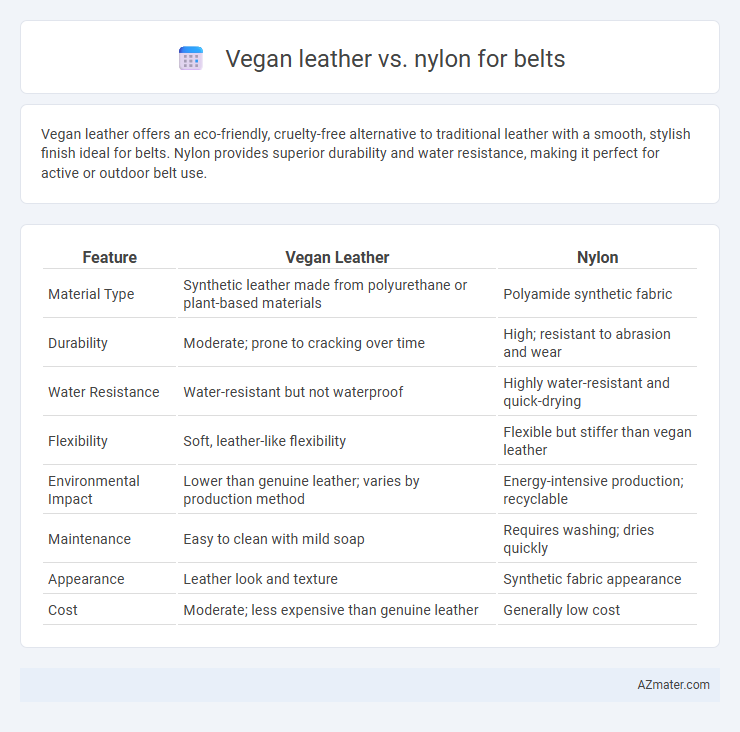Vegan leather offers an eco-friendly, cruelty-free alternative to traditional leather with a smooth, stylish finish ideal for belts. Nylon provides superior durability and water resistance, making it perfect for active or outdoor belt use.
Table of Comparison
| Feature | Vegan Leather | Nylon |
|---|---|---|
| Material Type | Synthetic leather made from polyurethane or plant-based materials | Polyamide synthetic fabric |
| Durability | Moderate; prone to cracking over time | High; resistant to abrasion and wear |
| Water Resistance | Water-resistant but not waterproof | Highly water-resistant and quick-drying |
| Flexibility | Soft, leather-like flexibility | Flexible but stiffer than vegan leather |
| Environmental Impact | Lower than genuine leather; varies by production method | Energy-intensive production; recyclable |
| Maintenance | Easy to clean with mild soap | Requires washing; dries quickly |
| Appearance | Leather look and texture | Synthetic fabric appearance |
| Cost | Moderate; less expensive than genuine leather | Generally low cost |
Introduction to Vegan Leather and Nylon Belts
Vegan leather belts offer an animal-friendly alternative made from synthetic or natural materials like polyurethane or cork, providing durability and a sleek appearance similar to genuine leather. Nylon belts are known for their lightweight, flexible, and water-resistant properties, making them ideal for casual or outdoor use. Both materials present unique benefits in terms of sustainability and functionality, appealing to different style and performance preferences.
Material Composition and Sustainability
Vegan leather, typically made from polyurethane or plant-based materials like cork or pineapple leaves, offers a cruelty-free alternative with biodegradable options depending on its source. Nylon, a synthetic polymer derived from petrochemicals, provides durability and water resistance but involves non-renewable resources and slower degradation rates. Considering sustainability, vegan leather from renewable or recyclable components generally has a lower environmental impact compared to nylon's reliance on fossil fuels and longer persistence in ecosystems.
Durability and Longevity Compared
Vegan leather, made from polyurethane or plant-based materials, offers moderate durability but tends to degrade faster under constant stress compared to nylon, which is known for its exceptional strength and abrasion resistance. Nylon belts maintain their shape and appearance longer due to their synthetic fibers, which resist fraying, tearing, and environmental damage such as moisture and UV exposure. In terms of longevity, nylon outperforms vegan leather by sustaining structural integrity and visual appeal through extended wear and harsh conditions.
Comfort and Wearability Factors
Vegan leather offers a soft, flexible texture that molds comfortably to the wrist or waist, providing breathability and reducing irritation during extended wear. Nylon belts are lightweight and strong but may cause discomfort due to less stretch and potential moisture retention, leading to chafing in warm conditions. Choosing between vegan leather and nylon for belts depends on prioritizing either natural feel and skin-friendliness or durability and moisture resistance.
Aesthetic Appeal and Style Options
Vegan leather offers a sophisticated, smooth finish that closely resembles genuine leather, making it ideal for belts with a classic, high-end aesthetic favored in formal and casual styles. Nylon belts provide a more casual, utilitarian look with a variety of textures and bold color choices, appealing to streetwear and sporty fashion trends. Both materials support diverse style options, but vegan leather belts excel in delivering a timeless and versatile appearance.
Environmental Impact: Vegan Leather vs Nylon
Vegan leather, often made from plant-based materials like pineapple leaves or cork, offers a lower carbon footprint and reduced water consumption compared to traditional leather, while also being biodegradable. Nylon, a synthetic polymer derived from petrochemicals, is durable but contributes significantly to microplastic pollution and takes hundreds of years to decompose, posing long-term environmental hazards. Choosing vegan leather belts supports sustainability by minimizing reliance on fossil fuels and lowering pollution, whereas nylon belts present challenges in waste management and ecological persistence.
Maintenance and Cleaning Requirements
Vegan leather belts require gentle cleaning with a damp cloth and mild soap to maintain their texture and prevent cracking, while avoiding excessive moisture to extend durability. Nylon belts are more resilient, allowing for machine washing or hand washing with soapy water, making them easier to clean and maintain, especially in outdoor or high-activity settings. Regular conditioning is necessary for vegan leather to preserve its appearance, whereas nylon benefits from quick drying to prevent mildew and odor buildup.
Price and Value for Money
Vegan leather belts typically offer a more affordable option compared to high-quality nylon belts, providing a stylish look without the premium price tag. Nylon belts, known for exceptional durability and water resistance, often justify their higher cost with extended lifespan and functional versatility. When evaluating price and value for money, vegan leather suits budget-conscious consumers prioritizing aesthetic appeal, while nylon appeals to those seeking long-term performance and rugged use.
Ethical Considerations in Material Choice
Vegan leather, made from plant-based or synthetic materials, offers a cruelty-free alternative to traditional leather, aligning with ethical concerns around animal welfare and environmental sustainability. Nylon, while durable and lightweight, is a synthetic polymer derived from petrochemicals, raising issues related to fossil fuel dependency and microplastic pollution. Choosing vegan leather over nylon for belts supports reduced animal exploitation and typically involves more eco-conscious manufacturing processes.
Which Belt Material is Right for You?
Vegan leather belts offer a cruelty-free, stylish alternative with a smooth finish and eco-friendly appeal, ideal for those seeking sustainable fashion. Nylon belts provide superior durability, water resistance, and flexibility, making them perfect for outdoor activities or casual use. Choosing the right belt material depends on your priorities: opt for vegan leather for ethical style or nylon for rugged functionality.

Infographic: Vegan leather vs Nylon for Belt
 azmater.com
azmater.com